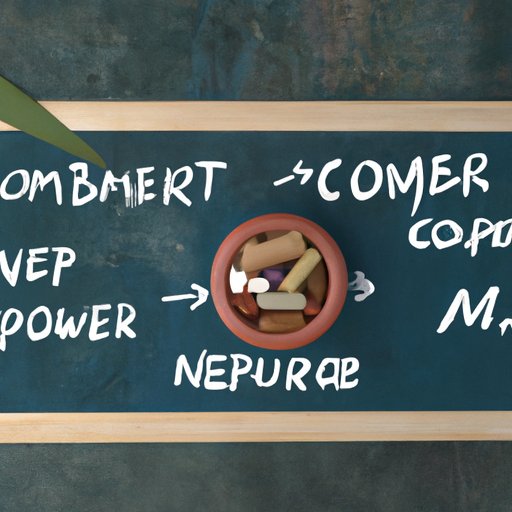Introduction
Constipation is a common digestive problem that affects people of all ages and can be debilitating. It occurs when bowel movements become difficult and infrequent, causing discomfort and pain. While it can be uncomfortable to talk about, there are natural remedies, medications, lifestyle changes, dietary advice, and gut health tips that can help alleviate symptoms and promote healthy bowel movements.
Natural Remedies to Relieve Constipation
One of the easiest ways to alleviate constipation is to increase your water intake. Drinking at least eight glasses of water a day can help soften stools, making it easier to pass. Fibrous foods such as vegetables, fruits, and whole grains also provide bulk and roughage to stools, which can help promote bowel movements. Regular exercise can also help promote bowel movements by stimulating the digestive muscles. Additionally, massaging your abdomen can help relieve constipation by promoting bowel movement and increased blood flow. Certain herbs and natural supplements like aloe vera juice, ginger, and magnesium can also be helpful.
Medications and Supplements for Constipation
If natural remedies are not effective, your healthcare provider may recommend medications and supplements to help alleviate constipation. Laxatives, which come in various forms such as bulk-forming, osmotic, and stimulant, can help soften stools and promote bowel movements. Stool softeners, on the other hand, help reduce the strain of bowel movements while also softening stools. Fiber supplements can also be beneficial in treating constipation by adding bulk to the stool, making it easier to pass. In some severe cases, your healthcare provider may recommend prescription medications such as lubiprostone and linaclotide.
Lifestyle Changes to Reduce Constipation
Your lifestyle plays a significant role in your digestive health. Lack of sleep and excessive stress can negatively impact your digestive system, leading to constipation. Improving your sleep habits, such as relaxing before bedtime and sticking to a consistent sleep schedule, can help promote bowel movements. Additionally, reducing stress levels can help alleviate constipation. Creating a regular bowel routine, such as setting aside time every morning for a bowel movement, can also train your digestive system and promote healthy bowel movements. Lastly, pelvic floor exercises can strengthen the muscles around the anus and rectum, making bowel movements more comfortable and less painful.
Foods to Avoid for Better Digestion
The types of foods you consume can significantly affect your bowel movements. Processed foods, dairy products, red meat, caffeine, alcohol, and artificial sweeteners can all contribute to constipation. Processed foods, for example, are low in fiber and cause dehydration, making it harder to pass stools. Dairy products can cause constipation as they are low in fiber and can slow down the digestive process. Red meat is also low in fiber and can lead to constipation if consumed frequently. Caffeine and alcohol are both dehydrating, which can cause the stools to harden and make them difficult to pass. Lastly, artificial sweeteners like aspartame and saccharin can cause gastrointestinal distress, leading to constipation.
The Importance of Gut Health for Constipation Relief
Good gut health is essential for healthy bowel movements. The gut-brain connection plays a crucial role in gut health and can impact constipation. Probiotics and fermented foods like yogurt, kefir, and pickled vegetables can help restore the balance of gut bacteria and promote healthy digestion. However, antibiotics and other substances can damage gut health by killing off beneficial bacteria, leading to constipation. Avoiding excessive antibiotic use and other harmful substances can help maintain good gut health and alleviate constipation.
Conclusion
Constipation can be a distressing and uncomfortable problem, but there are several natural remedies, medications, lifestyle changes, dietary advice, and gut health tips that can help alleviate symptoms. Drinking more water, increasing fiber intake, exercising regularly, training your pelvic floor muscles, and improving your gut health can all promote healthy bowel movements. If constipation persists or is severe, it is essential to seek medical advice. Your healthcare provider can suggest appropriate treatments to relieve your symptoms and improve your digestive health.
